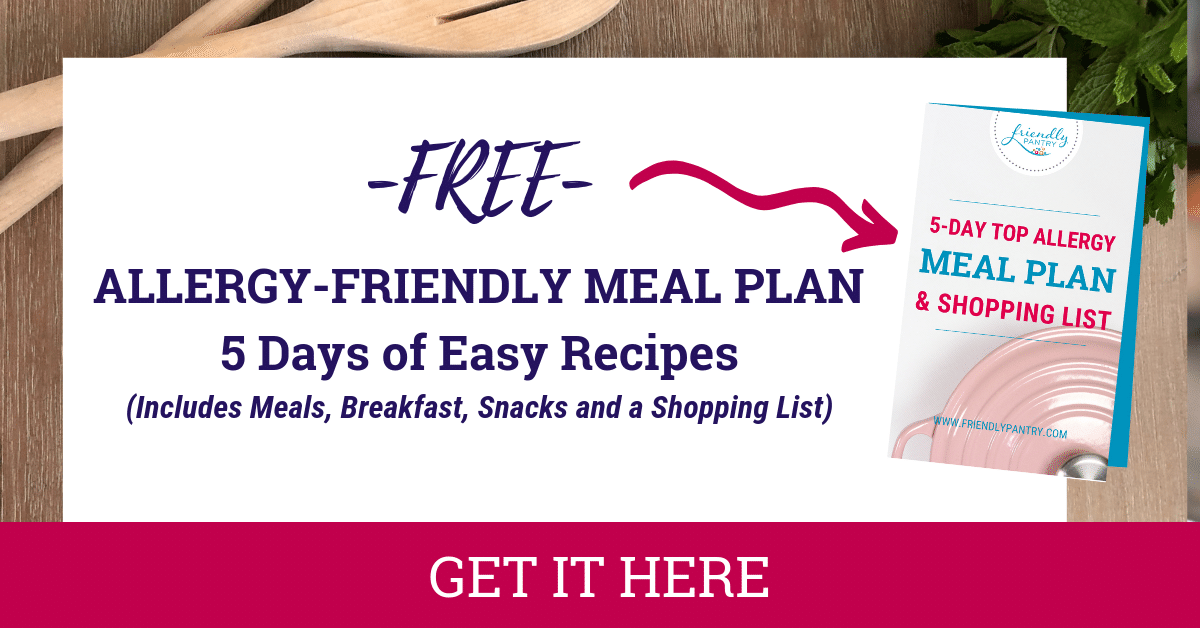3 Deal Breakers When Dining Out With Food Allergies
You can listen to this episode of Food Allergy Made Simple Podcast on Apple Podcasts, Spotify or anywhere you listen to podcasts.
You’ll get what’s in the blog, PLUS personal stories and reflections too!
What can I say? Dining Out With Food Allergies can feel risky.
But the right research & questions can decrease the risk and make it doable and even fun too!
In this episode, I’m sharing what I DON’T expect restaurants to do and 3 things I do expect them to do before we ever sit down to order.
If you’re wondering if you can dine out safely, OR you already dine out, but want to see if you want the same things, this post is for you.
Full disclosure here, we’ve had bad experiences dining out where we’ve researched restaurants online but still decided to leave once we got there.
We had one particularly bad experience at a restaurant and I want to devote a whole episode to that story. I’m planning to share that in episode 15. So if you’re listening to this episode when it’s released, that episode won’t be out for a few weeks.
I know it doesn’t seem ideal to have to leave a restaurant or not even go in because of what they say at the door, but I think as food allergy families, we shouldn’t look at it as a failure, but instead, it’s a sign of confidence and knowledge of what's safe for your family.
Because it’s important to have the confidence to know when it may not be right or safe to eat somewhere. And if that restaurant doesn’t answer your questions or seems like they don’t know what they’re doing, leaving is the best thing you can do for safety.
So I want to normalize doing what you need to do for safety and I also want to give you full confidence with the Dining Out With Food Allergies Workshop.
This workshop will take you by the hand and show you the steps to figure out which restaurants are worth trying with food allergies, and which restaurants are NOT. It will help you decide if you need to leave before ordering.
So If you’re looking for that allergy-friendly restaurant to meet with friends or celebrate every once in a while, go to the link in the show notes for the Dining Out With Food Allergies workshop. It only takes about an hour to increase your confidence with Dining Out.
ONE Thing I Don’t Expect From Restaurants When Dining Out With Food Allergies.
I don’t expect restaurants to GUARANTEE their food is allergen-free.
I know this sounds nerve-wracking, BUT a guarantee without implementation doesn’t mean anything.
I mean we’ve all seen the menu disclaimers at restaurants, and honestly, if a restaurant has a disclaimer that says “We cannot guarantee allergens are not present in our food” and nothing else, I’m instantly turned off. So much so, that we may leave the restaurant.
Not only that, but I feel like this disclaimer violates one of my other expectations, which I’ll get to in a bit.
But on the other hand, …
If a restaurant disclaimer says: “We have allergen policies in place, and we take care to provide training for our staff about safe food allergy procedures, but, we are not able to guarantee allergens will not be in food.
That is a WHOLE different story, right?
Now they’re talking about what they do to keep food allergy people safer, even though they recognize that being in a busy restaurant might mean an allergen is a food when they don’t intend it to be.
To me, this is ONE indicator that they take food allergies seriously. Of course, there are other indicators that we’ll get to, but this is a great start.
So now that I’ve covered what I DON’T expect, I want to talk a little about the 3 deal-breakers I have of restaurants before we will eat there.
3 Dealbreakers When Dining Out With Food Allergies
The first thing I expect from a restaurant when it comes to food allergy safety is:
Thorough training of all staff about food allergy safety.
When we talk about training, I mean that I want EVERYBODY at the restaurant to be trained in their own, appropriate way.
This means everyone from the host/hostess to the bussing staff to the line cooks and chefs and so on.
So, maybe a host/hostess doesn’t need to know the details that a chef or cook needs to know. Still, I expect that if I ask that host/hostess about whether the restaurant can accommodate food allergies, they can either give me an answer that is truthful and accurate and makes sense, OR they realize that this is an important question. They need to get a chef or manager to talk to me.
And then the training should also go further for the waitstaff. For example, once I’m seated, I like to ask the waitstaff if there are any dishes we need to avoid, given our allergies. This opens the conversation and allows me to see how they respond. I LOVE it when they say, “let me check with the chef”. Ideally, I don’t want them to be guessing at what will work. I want them to alert the chef and check with them.
And they should be trained to do this, without doubt. The last thing I want is waitstaff to fumble and say things they think I want to hear because they aren’t properly trained.
This removes all of my confidence right away.
2. Good food allergy policies and procedures that are followed.
Finding out whether the restaurant has good food allergy policies can seem difficult because we aren’t able to fully see what goes on behind the scenes. Even so, I feel like we can get a good feeling whether there are good policies and procedures from little clues.
For example, what does the website say about food allergies? If it doesn’t say anything, that could be a red flag.
When you call, how do they answer your questions?
As an aside, I want to encourage you to call restaurants and ask questions. Even if they don’t answer in a way that makes you comfortable with dining there, calling and asking questions SHOWs them that food allergies are an issue. The more of us that do it, the more the restaurants will start to see how important it is. When they see that it’s important, they will be more inclined to take action on it.
Not only does calling restaurants increase food allergy awareness, but calling the restaurant gives you a unique window into that restaurant’s policies.
It starts right from the start of the call.
I like to see what the person who answers the phone says. If they seem to understand the seriousness of food allergies, it may show that they have good food allergy training in place. Not guaranteed, but it's a better chance than if the person who answers doesn’t know anything about food allergies. So I start with them and then move on to the manager or the chef.
Other tips that give you a peek into a restaurant’s food allergy policies are:
What does the menu say? What does the Host/hostess say when you mention food allergies upon arrival? All of these things will help you pick up on the restaurant's knowledge and policies by looking at what they do as a whole.
3. Care and attention.
What does this mean for the restaurant to take care and attention?
When dining out, I expect that they SHOW and ACT in a way that makes it seem like the allergy is important to them.
One example I’ve seen is that the manager is notified and comes to the table. I feel like the waitstaff can sometimes be bogged down, just with all the table's needs from getting water to getting a new set of cutlery etc.
Usually, not always, the manager has likely been working at the restaurant longer, and is maybe a bit more let’s say “mature” and responsible and hopefully able to fully dedicate the time to take care and attention that’s needed to check the recipes, and then watch that the right dish is brought to the right table.
Another sign of care and attention to me is STATING that the meal is an allergy meal and also which allergens the meal is avoiding when they deliver the dish.
For example, when they say “This is the peanut-free and gluten-free dish” as they place it in front of my daughter takes a lot of the stress away. First of all, it shows that they avoided the correct allergens and that the message went through to the kitchen and came out on the other end to meal delivery. If they say the wrong allergens, it’s an instant red flag.
Next, when they state that this is the allergy meal, it shows that they thought about the allergy meal when they picked it up and that they chose the right meal, and not another meal by mistake.
And there are other signs of care and attention too, but you get the idea.
Of course, the expectations I have of restaurants doesn’t dissolve our due diligence. This is so important. Even if we are at the MOST allergy-friendly restaurant we know, we CAN’T let our guard down.
Yes, we have left restaurants upon arrival if they don’t seem to be able to accommodate allergies as well as we thought because safety is the biggest priority.
BUT even so, we have also found some amazing restaurants both at home and abroad that are doing a great job!
So, it IS possible to dine out safely with food allergies! But you can’t just pick any restaurant out of thin air. It does take research and diligence. But in the end, if you are even able to find 1 or 2 restaurants that you can go to in a pinch, it is helpful and worth the effort you need to take to vet the restaurant.
That’s why I created my Dining Out With Food Allergies Workshop. Not only do you get our best tips and strategies for dining out as safely as possible,, but you also get a workbook that will take you through the process of vetting a restaurant.
I’ll take you by the hand and walk you through some important considerations and ways to figure out if a restaurant is allergy-friendly or not. I want to help make it as safe as possible for you and your family, and you’ll love how this workshop helps with that in an hour or less..
PS You can get the Dining Out With Food Allergies Workshop for 50% off if you buy it at the same time as you purchase the Food Allergy Travel Workshop.
All you have to do is sign up for the Food Allergy Travel Workshop and then choose to get the Dining Out With Food Allergies Workshop and you’ll get it for 50% off. A steal, especially if you are planning a trip now or in the future.




